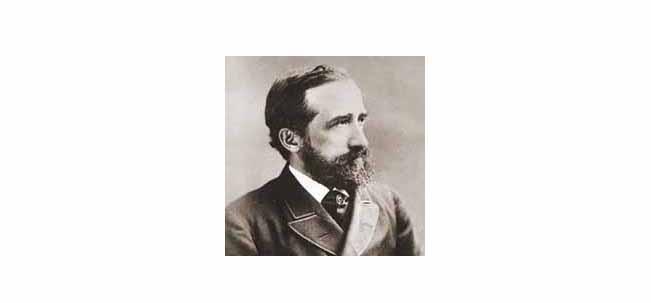
A Stroke of Genius- Powerful Moves! Zukertort!
When I look at the games of certain Masters, like Zukertort, Lasker and Nimzowitch, I am impressed by the power of their moves. Some of their moves are like cannons, they have so much weight and truth behind them!
(born Sep-07-1842, died Jun-20-1888, 45 years old) Poland (federation/nationality United Kingdom)
[what is this?] |
|
| Johannes Hermann Zukertort was born in Lublin, Congress Poland*.
Background Zukertort’s father was a Christian Protestant missionary of Jewish origin at a time when the Christian mission among the Jews in Russian-occupied Poland was illegal. Consequently, the Zukertorts emigrated to Prussia. In 1861, Johannes enrolled at the University of Breslau to study medicine, although it is unclear if he completed his degree. It was in Breslau he met Adolf Anderssen and started playing chess, moving to Berlin several years later in 1867. After again moving, this time to London, he became a naturalised citizen of the United Kingdom in 1878. Matches <Non-title> In 1868, he played and lost a match to Anderssen in Berlin by 3.5-8.5 (+3 -8 =1). In 1871, he turned the tables, defeating Anderssen in a match by 5-2 (+5 -2). In 1872, he moved to London where he played Wilhelm Steinitz, losing 9-3 (+1 -7 =4). In May - June 1880, he had defeated Samuel Rosenthal, the French champion, Rosenthal - Zukertort (1880). In 1881, he played and defeated Joseph Henry Blackburne by 8.5-4.5 (+6 -2 =5). After losing the World Championship match against Steinitz in 1886, he lost a second match he played against Blackburne in 1887 by 5-9 (+1 -5 =8), Blackburne - Zukertort (1887) , probably because of declining health (he died the following year). <Title> The Steinitz - Zukertort World Championship Match (1886) lasted from 11 January to 29 March 1886. After leading by 4-1 after 5 games, Zukertort won only one more game, the thirteenth, going on to lose the match by 7½-12½ (+5 -10 =5). Tournaments Zukertort placed 3rd in London in 1872 behind Steinitz and Blackburne; 2nd behind Blackburne in London in 1876; 1st in Cologne and 2nd in Leipzig in 1877 behind Louis Paulsen; equal 1st with Simon Winawer at the Paris International Chess Congress in 1878, beating Winawer in the play-off; 2nd at Berlin in 1881 behind Blackburne; =4th in Vienna in 1882 behind Steinitz, Winawer and James Mason; and 1st in London in 1883, 3 points ahead of Steinitz. Zukertort's win in London in 1883 was considered to be his most significant success. The tournament was a double round robin contest with 14 players and therefore ran for 26 rounds; it also featured the first time the double-sided chess clock was used in competition. He won his games against most of the world's leading players including Steinitz, Blackburne, Winawer, Mikhail Chigorin, George Henry Mackenzie, Berthold Englisch, Samuel Rosenthal, and Henry Edward Bird, scoring 22/26 (after starting with 22/23), and finishing 3 points ahead of Steinitz, who was 2nd with 19/26. This tournament led to the World Chess Championship match between these Zukertort and Steinitz three years later. After his defeat in the World Championship match in 1886, Zukertort's health declined, and he was diagnosed with rheumatism, coronary heart disease, kidney problems, and arteriosclerosis. His tournament results declined steeply, placing 7th in London and 3rd in Nottingham in 1886; 15th in Frankfurt and 4th in London in 1887, and 7th in London in 1888. When he unexpectedly died later that year, he was leading a tournament at Simpson’s Divan in which he was scheduled to play his last two rounds against Blackburn and Amos Burn. ...Dr. Frank Jeeves, the house physician of Charing-Cross Hospital ...had since made a post-mortem examination, and found that death was due to cerebral haemorrhage. The kidneys of the deceased were slightly unhealthy ...and the arteries and the base of the brain were diseased... Source - <Manchester Courier and Lancashire General Advertiser - Monday 25 June 1888, p.8.> Chess legacy and epilogue Zukertort was one of the ablest attacking players of his generation, ranked by Chessmetrics as the number 1 player for 56 months between 1878 and 1886.** Yet, unlike the majority of attacking players, Zukertort preferred openings such as 1. c4 and 1. Nf3 that were closed or semi-closed and offered the possibility of transpositions. In the early 1880s 1. Nf3 was known as "Zukertort’s Opening", 40 years before it became known as the Réti Opening. His name is also associated with the Colle-Zukertort Opening: <1.d4 Nf6 2.Nf3 d5 3.e3 e6 4.Bd3 c5 5.b3 Nc6 6.O-O Bd6 7.Bb2 O-O>, which is frequently reached by transposition. In 1879, Zukertort was co-editor, with Leopold Hoffer, of The Chess Monthly. He also demonstrated his ability to play blindfold simuls when in 1876, he played sixteen games simultaneously while blindfolded, winning by 13-3 (+11 -1 =4). He died in London after playing a game in a tournament at Simpson's Divan. He was buried in Brompton Cemetery in London. In recent times his grave had fallen into disrepair and in 2012 it was restored and rededicated after British Grandmaster Stuart Conquest organized a chess appeal that attracted the necessary funds from the Polish Government and the chess community.*** Sources * Congress Poland was essentially a Russian possession of part of 19th century Poland which was subsequently returned to Poland at the end of World War I: Wikipedia article: Congress Poland; ** Chessmetrics: http://chessmetrics.com/cm/CM2/Play.; *** Johannes Zukertort’s grave rededicated in London: http://www.chessvibes.com/reports/j.; Edward Winter’s Chess Notes ; http://www.chesshistory.com/winter/.Johannes Zukertort by Bill Wall: http://web.archive.org/web/20091028. |
|